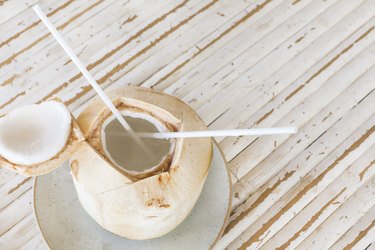
Coconut water is rich in electrolytes, and according to the Mayo Clinic, contains half as many calories as fruit juice. Coconut water health benefits are one of the reasons it's so popular, but for some, it can cause diarrhea.
Tip
Drinking coconut water can rehydrate you, but when you consume too much coconut water, it could cause diarrhea.
Video of the Day
Coconut Water Health Benefits
Coconut water health benefits have been a big part of marketing campaigns for the various products available today. Unfortunately, there is limited science out there to support these claims, and more research needs to be done to confirm the positive aspects that have been identified.
Video of the Day
An April 2012 animal study, published in Asian Pacific Journal of Tropical Medicine, demonstrated that coconut water helped to reduce insulin levels, blood pressure, triglycerides and free radical activity. However, until more research is done, there's no way to be sure these effects would also occur with humans.
A March 2013 study in the Journal of Surgical and Clinical Research showed that coconut water lowers blood pressure due to the potassium and sodium content. The study also revealed it may be an effective sports drinks for athletes. Coconut water may behave as a diuretic because of increased urination.
The study also noted that people who have diarrhea and those with kidney conditions shouldn't use coconut water because of the fact that it causes levels of potassium in the blood to increase. Ultimately, the study concluded the need for additional research to support coconut water having any therapeutic effects.
Is Coconut Water a Laxative?
Coconut water isn't marketed as a laxative, because most people can tolerate it well. In fact, it's thought that it can help keep you hydrated while dealing with diarrhea.
However, USDA data show coconut water is a rich source of sodium and phosphate. According to the Mayo Clinic, sodium phosphate is in a class of laxatives called "salts" that are used for rapid emptying of the bowels. That's why if you have too much coconut water, it can cause diarrhea.
Commercially prepared coconut water drinks may also contain other flavors and additives such as sugar or artificial sweeteners. Not only does this add calories and detract from the health benefits of coconut water, it can lead to coconut water diarrhea and other digestive problems because of sensitivity to artificial sweeteners.
Take for instance, Vita Coco. The brand adds sugar to their products, and according to their product FAQs, pasteurizes the juice with heat. Though they say this is intended to kill harmful bacteria and make the product shelf stable, the process destroys much of the nutrients coconut water provides.
That's why it's important to take a close look at the nutrition facts on the coconut water you're interested in buying. You could end up with something that's more unhealthy than you realize, just by believing that all coconut water products are created equal.
Disadvantages of Coconut Water
Though there are some who say coconut water can hydrate the body better than plain water, according to the Academy of Nutrition and Dietetics, there is no scientific evidence to suggest that is the case. Because of this, one of the biggest disadvantages of coconut water is that it is high in calories compared to plain water. If you rely on it too much, you could easily consume too many calories and cause weight gain.
Another one of the major disadvantages of coconut water is high potassium and other electrolytes. Consuming too many electrolytes can lead to an electrolyte imbalance. When electrolyte imbalances become severe, they are potentially life threatening. Though symptoms vary depending on which electrolyte is too high or too low in the body, all require attention.
- U.S. Department of Agriculture: "Nuts, Coconut Water, Liquid from Coconut"
- Mayo Clinic: "What is Coconut Water and What's Behind the Hype?"
- Asian Pacific Journal of Tropical Medicine: "Therapeutic Effects of Tender Coconut Water on Oxidative Stress in Fructose Fed Insulin Resistant Hypertensive Rats"
- Journal of Surgical and Clinical Research: "Therapeutic Use of the Coconut Water"
- Mayo Clinic: "Laxative (Oral Route)"
- Vita Coco: "Coconut Water Original"
- Vita Coco: "Frequently Asked Questions"
- Academy of Nutrition and Dietetics: "Coconut Water - Is It What It's Cracked Up to Be?"